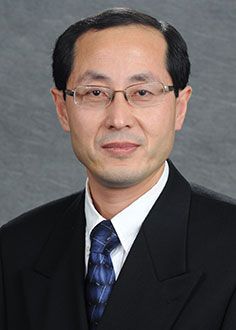
WASHINGTON (Oct. 04) – Today, patients with precancerous lesions, or early-stage breast cancer are usually diagnosed after a mammography screening. This method of detection can lead to false-positives and overtreatment, since mammography cannot determine whether pre-cancerous cells will actually turn into breast cancer. This may all change after Sidney Fu, M.D., professor of medicine at the George Washington School of Medicine and Health Sciences (SMHS), completes his study of early breast cancer detection using novel small RNA (microRNA or miRNA) biomarkers. Fu, who received a two-year, $362,060 grant from the National Cancer Institute to do this research, hopes to develop a blood test to determine with greater precision whether a patient carries cells that will eventually turn into breast cancer. This test could save women all around the world from unnecessary trauma and stress from chemotherapy, radiation, and surgery.
Breast cancer generally develops in the cells surrounding the milk-producing breast ducts. Somehow, either through internal or environmental factors, those cells gradually change in a patient who may develop breast cancer. Initially, cells will just accumulate. At this point, they are normal cells, which are called hyperplasia. If the cells continue to progress, they then become abnormal and enter into the Atypical Ductal Hyperplasia (ADH) stage. At the ADH stage, cells look abnormal under the microscope, but they are not cancer cells. If cells continue to progress into the Ductal Carcinoma In Situ (DCIS) stage (the most common type of non-invasive breast cancer), the cells then become cancer cells. Unfortunately, women who are diagnosed with DCIS have a higher risk of developing invasive breast cancer and surgery, radiation or a mastectomy to remove DCIS has become standard treatment. However, there is no proven way to predict which women diagnosed with DCIS will eventually develop invasive breast cancer over the years, or if they never will. With Fu’s research, novel biomarkers may be discovered to help physicians determine whether or not a patient diagnosed with DCIS should be treated rigorously or with simple follow-ups.
In less than a decade, miRNA has become one of the most important set of regulatory molecules in the body. Because the deregulation of these small RNAs are associated with cancer initiation and development, and because they circulate stably in blood, they have great potential as diagnostic and/or prognostic biomarkers for cancer and other diseases. This led Fu to believe that by studying the role of miRNA in early stage breast cancer, he could find novel biomarkers that could tell him whether or not cells will turn cancerous.
“If we can identify the miRNA signatures in DCIS, which can be used to differentiate between patients whose cells may eventually develop into invasive breast cancer and those patients whose cells will never develop into cancer, we would be able to eliminate unnecessary surgery, and/or chemotherapy and radiation therapy for those patients who will not benefit,” said Fu.
This research could help develop new methods for the detection of early breast lesions. With a simple blood test, physicians would be able to use the information to guide their clinical practice, said Fu.


